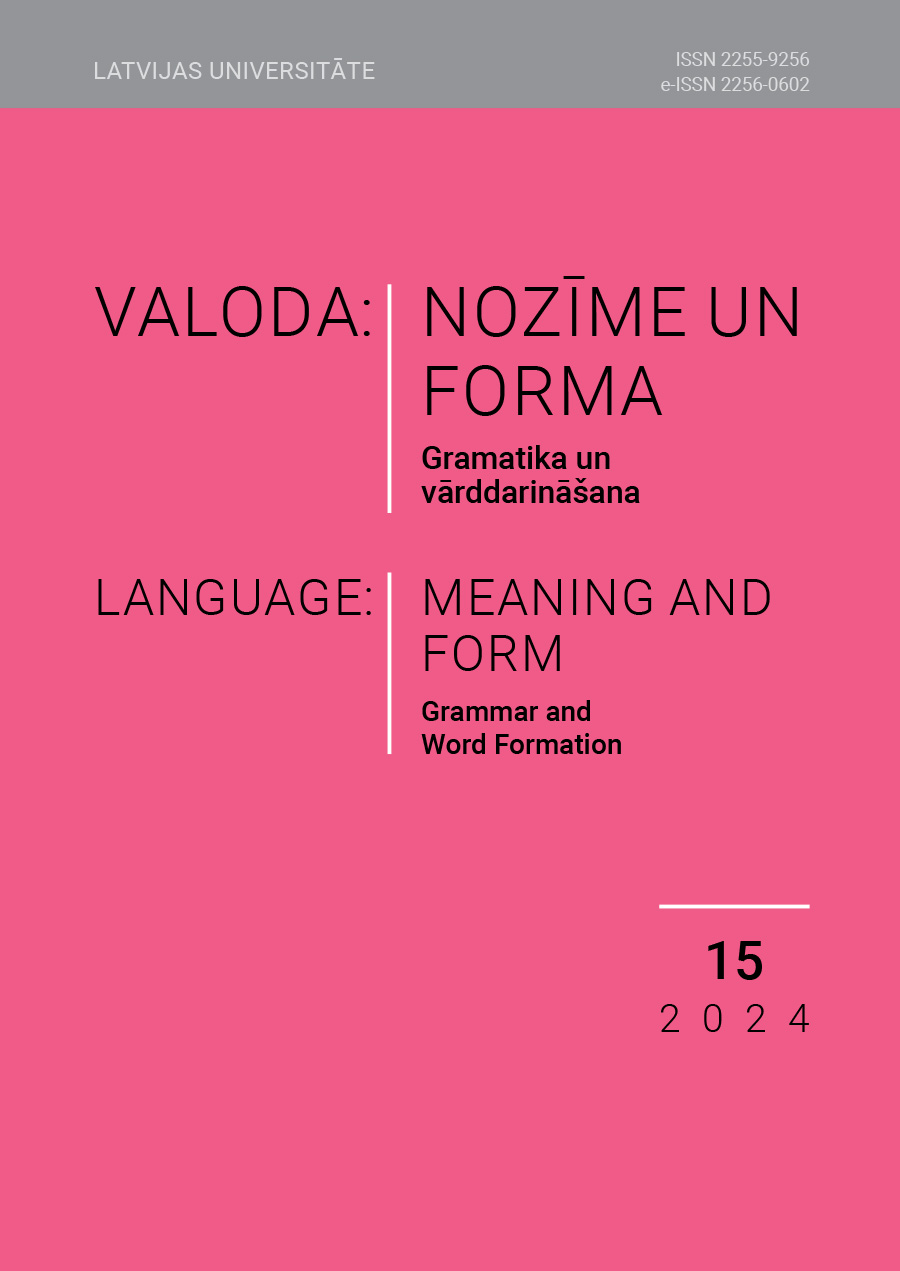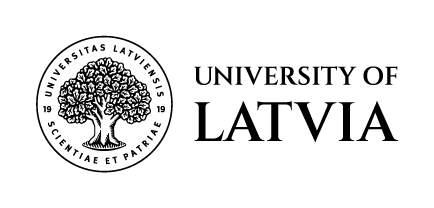Verbs pietikt ‘suffice’, trūkt ‘lack’ and the case of subject in affirmation and negation
DOI:
https://doi.org/10.22364/vnf.15.07Keywords:
Latvian, syntax, syntactic valency, verbs pietikt ‘suffice’, trūkt ‘lack’, subject, genitive and nominative competitionAbstract
In modern Latvian, genitive and nominative competition can be observed in the subject position of the sentence. The third-person verbs pietikt ‘suffice’ and trūkt ‘lack’ have the subject of the sentence in the genitive case, but in spontaneously created texts the subject of the sentence can also be found in the nominative case. The purpose of the article is to analyse the verbs pietikt ‘suffice’ and trūkt ‘lack’ and their syntactic valency in connection with the subject of the sentence in affirmation and negation.
In the individual collection, there are 200 examples for each verb – 100 in the affirmative and the same number in the negative (400 examples in total). Spontaneous use of the Latvian language in social media texts, university seminars, colloquial speech, radio broadcasts has been chosen as the practical material of the study. For comparison, the corpus of the Latvian language “Pandemia Diaries” (PanDi) was selected, the texts of which have not been edited, as in the individual collection of the author of the article. The set of examples consists of 74 examples with the verb pietikt ‘suffice’ and 62 examples with the verb trūkt ‘lack’.
The verb netrūkt ‘not lack’ in connection with the subject of the sentence in the genitive has the highest percentage (87 %) in the individual collection. Analysing the PanDi data, where there are only 16 sentences with the verb trūkt ‘lack’ in negation, in all cases (100 %) it has a subject of the sentence in the genitive. The verb in negation is more connected to the subject of the sentence in the genitive both in the individual collection and PanDi data. It is also considered whether the analysed sentences are in oral or written form.
References
Facebook. Tiešsaistes sociālais tīkls. Pieejams: https://facebook.com
Radiostacija „Latvijas Radio 1”.
Radiostacija „Latvijas Radio 2”.
Reinsone, Sanita, Ļaksa-Timinska, Ilze, Jaudzema, Justīne. 2022. Pandēmijas dienasgrāmatas. 2020–2022. CLARIN-LV digitālā bibliotēka. Pieejams: http://hdl.handle.net/20.500.12574/48
Spektors, Andrejs et al. 2024. Tēzaurs.lv, 2024. Vasaras versija. CLARIN-LV digitālā bibliotēka. Pieejams: http://hdl.handle.net/20.500.12574/107
Twitter. Tiešsaistes mikroblogošanas vietne. Pieejams: https://twitter.com
Whatsapp. Tiešsaistes saziņas lietotne viedtālruņiem. Pieejams: https://whatsapp.com
Ahero, Antonija et al. 1962. Mūsdienu latviešu literārās valodas gramatika. II. Rīga: LPSR Zinātņu akadēmijas izdevniecība.
Beitiņa, Maigone. 2009. Mūsdienu latviešu literārās valodas sintakse. Liepāja: LiePA.
Berg-Olsen, Sturla. 2005. The Latvian Dative and Genitive: A Cognitive Grammar Account. Oslo: University of Oslo.
Berg-Olsen, Sturla. 2009. Lacking in Latvian: Case variation from a cognitive and constructional perspective. The Role of Semantic, Pragmatic, and Discourse Factors in the Development of Case. Barðdal, Jóhanna, Chelliah, Shobhana L. (eds.). Amsterdam/Philadelphia: John Benjamins Publishing Company, 181–202. https://doi.org/10.1075/slcs.108.11ber
Endzelīns, Jānis. 1951. Latviešu valodas gramatika. Rīga: Latvijas Valsts izdevniecība.
Endzelīns, Jānis, Mīlenbahs, Kārlis. 1923. Latviešu gramatika. Otrs, pārstrādāts iespiedums. Rīga: Valtera un Rapas akciju sabiedrības izdevums.
Freimane, Inta. 1985. Vienkāršs teikums un tā paplašināšana. Rīga: Latvijas Valsts universitāte.
Freimane, Inta. 1993. Valodas kultūra teorētiskā skatījumā. Rīga: Zvaigzne.
Freimane, Inta. 2008. Trešā persona latviešu verbu sistēmā. Rīga: Latvijas Universitātes Akadēmiskais apgāds.
Haselow, Alexander. 2017. Spontaneous Spoken English. An Integrated Approach to the Emergent Grammar of Speech. Cambridge: Cambridge University Press. https://doi.org/10.1017/9781108265089
Holvūts, Aksels. 2012. Vispārīgās sintakses pamati. Sirmule, Lāsma (tulk.). Rīga: Latviešu valodas aģentūra.
Kalnača, Andra. 2002. Lietvārda locījumu formu konkurence latviešu valodā. Linguistica Lettica. 10, 135–150.
Kalnača, Andra. 2007. Ģenitīva sinonīmijas stilistiskās funkcijas mūsdienu latviešu valodā. Acta Humanitarica Universitatis Saulensis. 3, 68–78.
Kalnača, Andra. 2014. A Typological Perspective on Latvian Grammar. Warsaw/Berlin: De Gruyter Open. https://doi.org/10.2478/9783110411317
Kalnača, Andra, Lokmane, Ilze. 2018a. Teikuma priekšmeta locījums un vārdu secība latviešu valodas eksistenciālteikumos. Dzīves lingvistika. Veltījumkrājums profesoram Jānim Valdmanim. Vītola, Inita (red.). Rīga: Latvijas Universitātes Akadēmiskais apgāds, 207–221.
Kalnača, Andra, Lokmane, Ilze. 2018b. Subject case alternation in negated existential, locative, and possessive clauses in Latvian. Kalbotyra. 71, 42–63. https://doi.org/10.15388/Kalbotyra.2018.3
Kalnača, Andra, Lokmane, Ilze. 2021. Latvian Grammar. Riga: University of Latvia Press. https://doi.org/10.22364/latgram.2021
Kalnača, Andra, Lokmane, Ilze, Metslang, Helena. 2019. Subject case alternation in Latvian and Estonian existential clauses. Eesti Rakenduslingvistika Ühingu aastaraamat / Estonian Papers in Applied Linguistics. 15, 53–82. http://dx.doi.org/10.5128/ERYa15.04
Lagzdiņa, Sarmīte. 1997. Verbs nebūt morfoloģiskajā paradigmā un teikumā. Savai valodai. Rīga: LZAV, 165–200.
Lauze, Linda, Auziņa, Ilze. 2023. Korpusu un individuālā vākuma salīdzinājums: ģenitīva un nominatīva konkurence saistījumā ar adverbu. Valoda: nozīme un forma. 14, 111–125. https://doi.org/10.22364/vnf.14.08
Lokmane, Ilze. 2004. Valence un sintaktiskais obligātums. Vārds un tā pētīšanas aspekti. 8, 268–275.
Lokmane, Ilze. 2013. Vienkārša teikuma formālā (strukturālā) organizācija. Latviešu valodas gramatika. Nītiņa, Daina, Grigorjevs, Juris (red.). Rīga: Latvijas Universitātes Latviešu valodas institūts, 710–766.
Lokmane, Ilze. 2017. Partitīva konstrukciju sintaktiskās īpatnības latviešu valodā. Valoda: nozīme un forma. 8, 91–99. https://doi.org/10.22364/VNF.8.7
Matthews, Peter H. 1997. Concise Dictionary of Linguistics. Oxford / New York: Oxford University Press.
Nešpore-Bērzkalne, Gunta. 2017. Trešās personas verbu saistāmība ar ģenitīvu: „Līdzsvarotā mūsdienu latviešu valodas tekstu korpusa” dati. RES LATVIENSES. IV, 138–146. https://doi.org/10.22364/RL.4.11
Skujiņa, Valentīna (red.). 2007. Valodniecības pamatterminu skaidrojošā vārdnīca. Rīga: Latvijas Universitātes Latviešu valodas institūts.
Smiltniece, Gunta. 2013. Lietvārds (substantīvs). Latviešu valodas gramatika. Nītiņa, Daina, Grigorjevs, Juris (red.). Rīga: Latvijas Universitātes Latviešu valodas institūts, 324–369.
Downloads
Published
Issue
Section
License

This work is licensed under a Creative Commons Attribution-NoDerivatives 4.0 International License.


